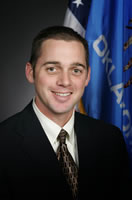In order to provide equal access and equal opportunity to people with diverse abilities, this site has been designed with accessibility in mind. Click here to view
Full Senate approves measure to better protect domestic violence victims
 Sen. Bryce Marlatt
Sen. Bryce Marlatt
The full Senate has given unanimous support to legislation to better protect victims of domestic violence. Senate Bill 1491, also known as Kristen’s Law, was authored by Sen. Bryce Marlatt and changes the legal definition of pattern of physical abuse. The bill was approved Wednesday 44 to 0.
Marlatt said establishing a pattern of abuse results in tougher fines and prison time for those convicted of domestic violence. Under current law, there must be three or more separate incidences of domestic abuse within the previous twelve months. He said his legislation would reduce that by requiring two separate incidents of domestic abuse to establish that pattern, and it would no longer be required that the two incidents must have happened in the previous year. If that pattern is established, conviction carries a penalty of up to ten years in prison and/or a fine of up to $5,000.
“Oklahoma is ranked third in the nation for women killed by men in domestic violence situations, and 41 percent of all homicides in our state are linked to domestic violence,” said Marlatt, R-Woodward. “The longer the abuse goes on, the more dangerous the situation is for the victim. This bill clears the way for tougher penalties to be handed down sooner, and hopefully, it can help us save lives.”
The Oklahoma Domestic Violence Fatality Review Board studied 223 intimate partner homicide cases that occurred between 1998 and 2014 involving 224 perpetrators and resulting in the deaths of 259 victims. The report found that in 74 percent of those cases, there was prior evidence of domestic abuse.
“I think when this law was first passed, it represented an important step forward in better protecting victims of domestic violence by strengthening penalties against their attackers,” Marlatt said. “But domestic abuse usually escalates, becoming more dangerous. I think reducing the number of incidences required for tougher penalties to apply is another important step for our state.”
SB 1491 now moves to the House of Representatives for consideration.
 Oklahoma Senate
Oklahoma Senate

